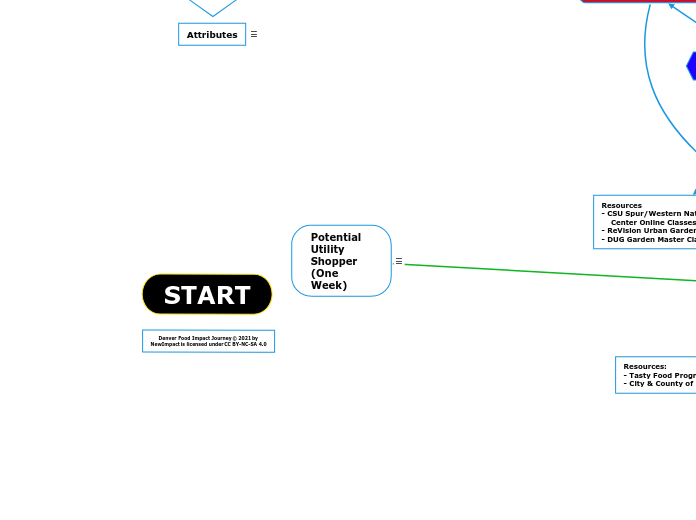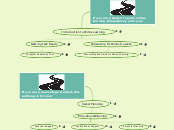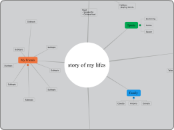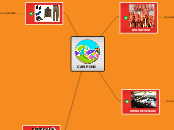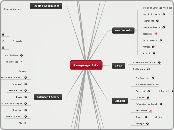Denver Food Impact Journey © 2021 by
NewImpact is licensed under CC BY-NC-SA 4.0
Attributes – Diagram Shape: Standard Square
Attributes are details that can be assigned to any element of the Impact Journey. Attributes can be any type of information that will add valuable context and depth to the map such as engaged orgs, key statistics, resources, related impact areas, etc. The most frequently used types of attributes are listed below.
Forks
Forks – Diagram Shape: Standard Diamond
Forks are steps in the journey that are followed by AT LEAST TWO immediate, subsequent events, similar to a fork in the road. Many Forks in Impact Journeys contain more than two outcomes.
Contrary to other process flows, Forks are not necessarily “Yes/No” decision points. Forks are generally where bottlenecks can be found.
- Examples of Forks: “Customer needs a cell phone provider”, “Student needs to find a way to school”, “Person needs to get a COVID-19 test”
Bottlenecks
Bottlenecks – Diagram Shape: Blue Hexagon
Bottlenecks are the points in an Impact Journey where the path splits into desired and undesired paths, and there is a significant effect of that split in the outcomes of the subjects of the Impact Journey. Bottlenecks can be viewed as highly significant Forks.
They are a focus of Impact Journeys because each Bottleneck is an opportunity for innovation. Innovating for that event in the subject’s Journey will create impact by preventing them from ending up on an undesired path.
- Examples of Bottlenecks: “Student needs computer” in an Impact Journey about Digital Learning.
- Whether the student has, or does not have, a computer (two paths) will have a significant impact on their ability to participate in digital learning.
Away from Goal
Towards Goal
Terminal Steps – Diagram Shape: Red/Green Pill
Terminal steps are at the END of a series of steps and show an outcome generated from the series of steps. These can result in "positive outcomes" labeled green pills or "negative outcomes" labeled red pills. Whether an outcome is labelled positive or negative depends on the boundaries of the Impact Journey and the project.
- Examples of positive Terminal Steps: "Goal achieved due to food affordability", "Impacted person successfully submits voting ballot"
- Examples of negative Terminal Steps: "Goal not achieved due to excessive food waste", "Impacted person becomes homeless again"
Impact Journey
Legend
GOAL
ACHIEVED
MARKET / SUPPLY CHAIN FACTORS
Food Pantry has online ordering,
delivery, or mobile pantry option
Increasing amount of 2nds/3rds/rescued produce being diverted/captured by online direct-to-consumer sellers
Resources:
-Misfits
-Imperfect Foods
Food Bank unable to source
culturally-relevant foods
Pantries lack funds needed to procure
foods needed for greater selection
Food bank's selection is limited by the selection from Food Bank of the Rockies
Relies on donated foods
Paths to obtaining food
Upcharges for fresh/healthy
key staples and produce
Delivery service does not accept
food supports (EBT, SNAP, WIC)
Goal not achieved due to restrictions
for using deliver services
Receives all 5 days of breakfast and lunch
Receives some breakfast and
lunch meals throughout the week
Does not receive enough food at school
Goal not achieved due to preparing
and consuming poor nutrition
Their schedule limits
the stores they go to
Have coupons for another store
Corporate donors are incentivized to donate unhealthy, physically heavy foods
Regional distributor's supply is heavily influenced by corporate donations
Finds all of shopping list
Pays for all of shopping list
Lack of transportation options
Not enough time to visit stores
Resources
- Denver Community Fridges
Considers financial resources
available to buy food
Feels more convenient to order out
Doesn't have enough time to
make grocery trips or cook
Doesn't want to deal with procuring
groceries because of laziness
Has enough money to buy full shopping list
Does not have access to
desired food retailers
Does not have access to
technology for delivery apps
Uses delivery service to access desired food retailer
Resources
- Instacart
- Safeway grocery delivery
Has access to desired food retailers
Does not grow sufficient amount of food
Grows sufficient amount of food
Doesn't have enough money to buy full shopping list
Language/cultural barriers
prevent access to food supports
Doesn't know of resources
to access food supports
Too much pride to access
community food supports
Does not access food supports
Goal not achieved
Accesses food supports
Other Organizations
- Church community
- Cultural community
- Soup Kitchens
Additional Food Supports
- TANF
- WIC
Local Food Pantry
Feels like they have no freedom of
choice to shop for groceries
Resources
- FlashFood
Cannot go to Food Bank due to distance
and lack of reliable transportation
Cannot go to Food Bank due to
limited hours of availability
Unsure of how to find food banks
Resources
- FoodPantries.org
Avoids food supports due to stigma,
shame, or embarrassment
Does not go to Food Pantry
Goal not achieved because they're
struggling to afford food
Has access to Food Pantry
SNAP
Needs food
Food bank is at the mercy of its regional dsitributor
Increased demand on system limiting choice
Regional Food Bank increasing share of major grocer food waste capture
Wants to grow their own food
Does not have access to
land/seeds/tools/knowledge
Resources
- CSU Spur/Western National
Center Online Classes
- ReVision Urban Gardens
- DUG Garden Master Classes
Does not have access to
land for growing food
Does not grow their own food
Has access to land for growing food
Food bank is unable to target procurement to recipients
Resources:
- Flashfood
- Food for All
Due to limited consumer data
tracking of shopping habits
Due to lack of data tracking
throughout supply chain
Resources:
- Starling Realtime
Store lacks the infrastructure (storage, supply chain) to sell fresh foods
Goal not achieved because food is wasted
Doesn't have the equipment
to store or prepare food at home
Has access to community
kitchen/storage
Doesn't know how to prepare healthy food
Resources
- Free Expanded Food and Nutrition
Education Program (EFNEP)
- CSU Extension
- Cooking Matters Recipes
Does not have access to healthy
recipes and cooking classes
Has access to healthy culinary
recipes and cooking classes
Obtains enough food
Limited storage/fridge space
restricts shopping capacity
Knows how to properly store food/
how to extend shelf life of food
Doesn't know how to properly store food
Resources
- Hungry Harvest Storage Tips
Food obtained is unhealthy
Goal not achieved because food
doesn't provide good nutrition
Knows how to prepare healthy food
Has storage and equipment to prepare food
Doesn't have adequate
time to prepare food
Has time to prepare food
Prepares food
Convenience Store
Unable to pay for higher priced goods
Goal not achieved due to
affordability, despite convenience
Store incentivized to provide poor quality, shelf stable foods
Wholesalers remove cost and risk of poor quality foods by supplying and stocking for store
Purchases unhealthy food
Goal not achieved due to lack
of nutritious food options
Food Pantry
Limited/misaligned food
selection at Food Pantry
Receives full shopping list of food
Food Retailer
Can't find all of shopping list
Lack of quality from
selected food retailer
Prefers some products from another
grocery store due to quality or cost
Too expensive to get full list
at selected food retailer
Cannot find desired culturally
responsive foods
Re-enters food
retailer shopping loop
Goal not achieved due to high time/energy cost to get their complete grocery list
Preparing food
Shopping Options --
"The Shopper Loop"
Requirements for shopping
START
Food bank cannot carry more fresh produce due to a lack of cold storage
No centralized resource to
help folks access food support
Feels like a place for poor people
or not welcoming/inclusive
"Not welcoming" isn't about physical attributes of food pantry;
MC helps with trauma/related impacted consumers
Variability and unpredictability
of supply, quality, variety
Food bank's selection is limited by what food they were able to rescue from grocery stores
Goes to school to receive meals
Resources:
- Tasty Food Program
- City & County of Denver
School administrations are reluctant
to be flexible with meal funding
Family is behind
on school bills
Income from parents limits
subsidized meals for students
Has excess food
Cheaper to leave food in fields
Increased food waste
Donation incentives
Does not enroll with SNAP
Language/cultural barrier
to enrolling in SNAP
Resources:
- Focus Point Family Resource Center
Input of time/energy doesn't make
the outcome worthwhile due to
low amount of support received.
Enrollment requirements are
too much/tough to complete,
esp. interviews
Resources
- mrelief
Unaware of eligiblity for program
Avoids enrolling due to Stigma
about SNAP being for "poor" people
Was overpaid by the gov't and had to repay, leading to SNAP no longer being worth it
Hit the benefit cliff
Must resort to other food supports
Enrolls with SNAP
Runs out of SNAP funds for the month
Still has SNAP funds for the month
Has enough funds to shop for groceries
Wants to obtain prepared food
Does not have sufficient funds to
buy nutritious prepared food
Attributes
Resources
- Food for All
Goes to fast food restaurants
Goal not achieved due to
lack of nutritious value
Has sufficient funds to buy
nutritious prepared food
Consumes food
Goal Achieved!
Potential Utility Shopper (One Week)
Who is the impacted person?
Is this the road to food insecurity or is this the impact journey of someone who is currently experiencing or are at risk of experiencing food insecurity?
